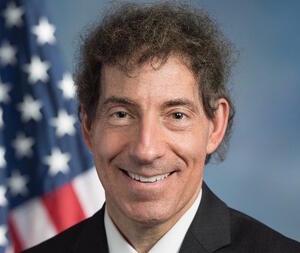Gerrymandering Isn't an Issue for Maryland Alone
Dear Congressman Raskin,
My name is Isabel Kirsch. I am a resident of Chevy Chase, Maryland and a rising high school senior at Georgetown Day School. I want to thank you for your work in Congress representing Maryland's 8th district. I appreciate your efforts to hold President Trump accountable for his possibly illegal actions, your work to address climate change, and your protection of the rights of women, minorities, and other marginalized groups. I am proud to be one of your constituents, and although I wasn't old enough to vote in this election, I will excitedly cast my ballot for your reelection.
I understand that you have countless issues to address, especially given the events of the past few weeks in the Trump White House. However, I'd like to draw your attention to one issue in particular that I think deserves more of your energy– gerrymandering. According to the Washington Post, Maryland is one of the most gerrymandered states in the country; our congressional districts are strangely shaped and connect voters across counties to be represented by one congressperson.
Right now, 7 out of our 8 congressional representatives are Democrats; however, Democrat Hillary Clinton received around 60% of the vote in Maryland in November. Although Clinton wasn't a hugely popular candidate, it doesn't seem logical that 87.5% of Maryland’s members of the House of Representatives are Democrats, yet only 60% of the population voted that way in the presidential election. Because of gerrymandering, there are more Democratic congressional representatives in our delegation than accurately reflects Maryland’s voter makeup.
As a committed Democrat, it might seem counterproductive for me to oppose something that makes this disproportionately Democratic congressional representation possible. However, I see gerrymandering in Maryland as part of a much larger national problem, and I urge you to use your platform as a federal representative to address it. Maryland is certainly an exception; for the most part, gerrymandered congressional districts favor Republicans. Therefore, if federal efforts to curb gerrymandering were taken, Democrats would reap the benefits of more representation in the House of Representatives. Given today's political climate and the Republican-controlled Congress, I know you'll agree with me that this step is important. I appreciate the initial steps you took toward reforming congressional redistricting on a state level while you were a state senator, and I hope that experience will translate to action in the House.
Although addressing gerrymandering would diminish the advantage that Democrats hold in Maryland, it would result in the election of moderate Republicans who would be more likely to support bipartisan legislation than other Republicans. Because Maryland is such a liberal-leaning state, any Republican running for Congress here would have to be relatively moderate to stand a chance of election. For example, Governor Larry Hogan is Republican, but he has also avowedly opposed Donald Trump. Although more balanced districts in Maryland might result in a few more Republicans in our congressional delegation, these Republicans would likely be less conservative on social issues than their counterparts from heavily gerrymandered and more staunchly Republican states. With more moderate Republicans in Congress, bipartisan legislation and cooperation will be much more likely than it is in today's polarized Congress.
The gerrymandering in our state has impacted me personally as well. I'm a proud Maryland resident, yet I spent last summer working with the Democratic Party of Virginia. Why? I knew that thanks to our gerrymandered districts, Maryland is an uncompetitive state when it comes to elections. I debated working in a Maryland campaign office but decided not to because I felt that my work would be more impactful in Virginia. This leads me to another reason that competitive congressional districts are so important–close elections will motivate people, especially young voters, to cast their ballots instead of feeling like their votes don’t matter. In the 2016 election, only 50% of the electorate aged 18 to 29 voted. Younger voters lean to the left, so their low voter turnout might be one of the many factors that led to a Trump presidency. Perhaps with more competitive congressional races, young voters would feel that their votes and voices matter more and would therefore be more inclined to vote. I know I would be, just as I'd be more inclined to get involved in Maryland campaigns.
For these reasons, I urge you to work on federal congressional redistricting reform. Right now, individually acting states are in charge of forming independent, non-partisan commissions for congressional redistricting. However, we need federal government action to mandate these practices across the country. Otherwise, gerrymandering will be addressed slowly and ineffectively, if at all. As a congressional representative from a highly gerrymandered state, you have a unique ability to enact legislation to address this issue.
I trust in your ability to make progress on this issue. I hope that you're able to devote more time to addressing gerrymandering for Marylanders, and for all Americans who want a functional and truly representative government. Thank you so much for your service and hard work.
Sincerely,
Isabel Kirsch
This piece was written as part of JWA’s Rising Voices Fellowship.






